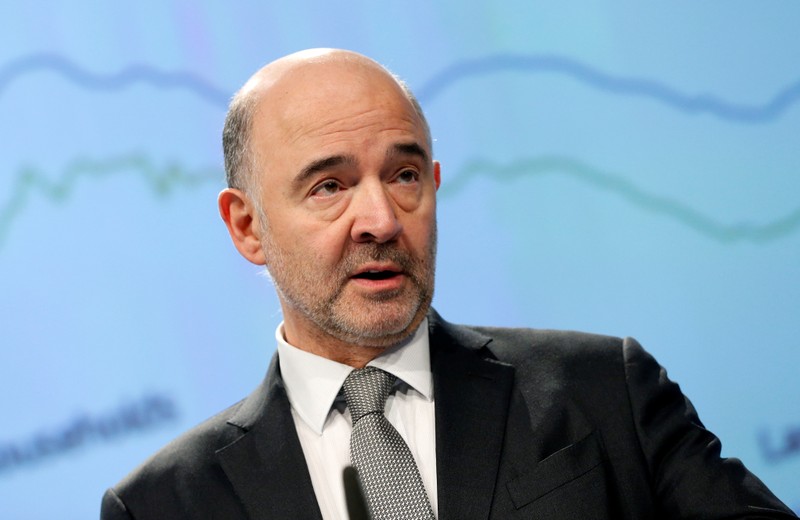
European Economic and Financial Affairs Commissioner Pierre Moscovici presents the EU executive’s economic forecasts during a news conference at the EU Commission headquarters in Brussels, Belgium February 7, 2018. REUTERS/Francois Lenoir
February 8, 2018
By Karolina Tagaris and Angeliki Koutantou
ATHENS (Reuters) – Greece and its lenders must agree on measures for medium-term debt relief in June, before Greece exits its bailout later in the summer, Europe’s Commissioner for Economic and Financial Affairs Pierre Moscovici said on Thursday.
Greece’s third international rescue programme ends in August and debt relief is expected to come up in negotiations over its bailout exit terms in the coming months.
Athens and its euro zone lenders are expected to flesh out a French-proposed mechanism that was presented last June and which will link debt relief to Greek growth rates. The economy is forecast to grow by 2.5 percent this year and in 2019.
Moscovici, in Athens for talks on the next steps in the programme, said he was “especially optimistic” about efforts to reach a solution on debt.
“I think that in June there needs to be a global agreement (on) how to conclude the programme but also how to handle medium-term debt measures,” Moscovici told reporters after meeting Prime Minister Alexis Tsipras.
A euro zone finance ministers meeting is scheduled for June 21.
Moscovici said a period of post-bailout surveillance also needed to be defined “for a country which recovers full sovereignty but which, at the same time, respects commitments towards its partners inside the euro zone.”
Greece has received a record 260 billion euros in three bailouts since 2010. Its public debt is forecast at 180 percent of gross domestic product this year and some European policymakers believe Athens cannot go it alone without debt relief and a standby line of credit.
But a precautionary credit line would come with conditions attached, something the government is keen to avoid after eight years of austerity that has worn down Greeks and hurt its popularity in polls.
Moscovici said Greece should not need a fourth bailout.
“Being in the programme means being in the programme, being out of the programme means being out of the programme, there cannot be a fourth programme or any kind of fourth programme, either a precautionary programme.”
He said it was up to Athens to devise a strategy for exiting its bailout and the post-bailout surveillance period.
Greece has been eager to prove it can stand on its own feet and access new money after its bailout ends.
On Thursday, it raised three billion euros from a seven-year bond issue at a yield of 3.5 percent, drawing strong investor demand despite volatility on world markets.
The bond is seen as a litmus test for Greece, which has been uncertain about attracting private sector interest and the move is a step towards the country building a cash buffer of up to 19 billion euros to cover debt repayments after the exit.
(Reporting by Karolina Tagaris and Angeliki Koutantou, Editing by William Maclean)

